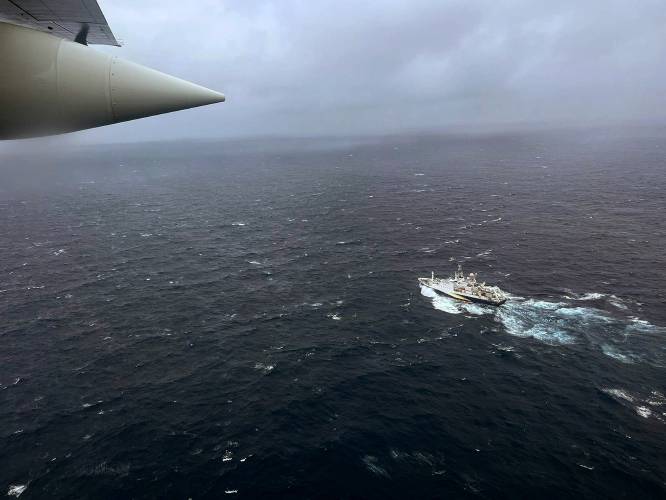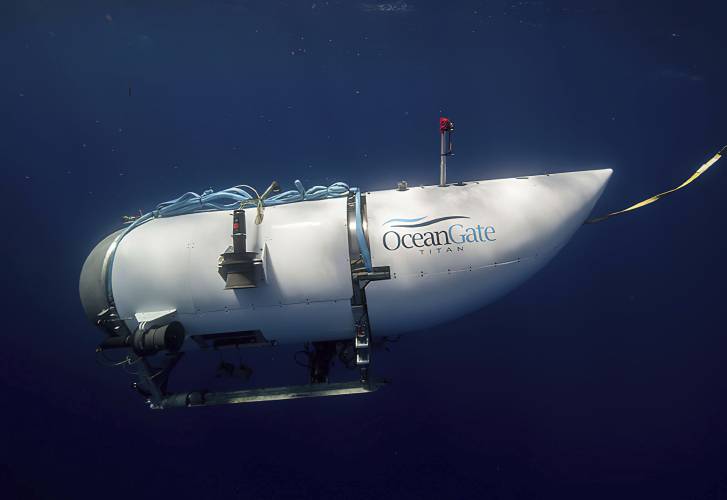Column: Those killed in the Titanic tourist submersible deserve respect, not mockery
| Published: 06-24-2023 10:23 PM |
As I write, the news of the implosion of Titan, the OceanGate submersible, is breaking. The five occupants are presumed dead. This piece of expensive ($250,000 per passenger) adventure tourism has dominated the news since the rescue mission began last Sunday.
The catastrophic end is drawing a great deal of critical commentary. Most reports indicate that the risk was high, the design of Titan was experimental (carbon fiber), and that the hull likely imploded very early in the mission.
Some folks question the very act of seeking to explore the remains of the Titanic, considering it a violation of sanctity. Others see the patrons of adventure tourism as pampered and self-indulgent — $250,000 apiece is a mighty expensive one-day vacation.
And, as is frequently the case in rescue attempts of this kind, there is concern about the vast resources expended in what was unfortunately an unsuccessful attempt. New Hampshire, as one example, reserves the right to make failed adventurers pay the costs of saving them from their misfortunes and/or misjudgments. Many times significant resources are expended saving ill-prepared dilettantes who wander into trouble and can’t find their way out. But in the broader scheme of things, these costs are a mere pittance. Even these occasional bumblers deserve respect. At least they got off the couch and gave living a try.
The scope of this incident, especially the search effort, is massive, but the dynamics are familiar.
Whether seeking to summit Everest, sink to the ocean’s greatest depths, fly in a body suit or “free solo” (climbing with no safety gear) a massive cliff, some humans are drawn to extreme adventure. Even in the relatively modest environs of New England, climbers find high risk on the Franconia Ridge in hostile conditions.
Similar debates are frequent in backcountry Colorado and other places where skiers and snowboarders try things most of us would not consider. They too are living at the edge and occasionally need rescuing. Some don’t make it, like the brother of a local friend of mine, who was buried in an avalanche a few years back.
On a much more modest scale, in July 2020 I had the misfortune/misjudgment of crashing on a mountain bike jump and needed helicopter transport, emergency surgery and extensive, incomplete, rehabilitation.
Article continues after...
Yesterday's Most Read Articles
 Homeless Upper Valley couple faces ‘a very tough situation’
Homeless Upper Valley couple faces ‘a very tough situation’
 Lebanon’s Jewell back from auto accident, more aware of ‘drowsy driving’ dangers
Lebanon’s Jewell back from auto accident, more aware of ‘drowsy driving’ dangers
 Plan on track to ship Upper Valley mail to Connecticut for sorting
Plan on track to ship Upper Valley mail to Connecticut for sorting
 West Lebanon crash
West Lebanon crash
 Crane crash on Interstate 89
Crane crash on Interstate 89
The victims of the Titan disaster and their loved ones should be granted time and space to process this tragic experience. And we should all be mindful of perspective — during this same time frame immigrants died at sea and, as in every other time frame, much greater tragedies have passed virtually unnoticed. In that sense, it seems almost obscene to dedicate our international attention to the fate of five wealthy men who died as a result of their own choices. But they are not to blame for the disproportion.
I write to offer what may be an unpopular view. I have respect, not disdain, for these adventurers and for others who choose to stretch the limits of possibility, often with acute awareness of the risks. I don’t know the presumed scientific benefits this particular mission claimed, but I believe there is value in every attempt to do what has not been done; to go where no one has gone, to build what has not been built. One fellow ocean explorer, defending the Titan mission despite the catastrophe, pointed out that the Wright brothers could have been deemed fools as easily as heroes had their flight ended in catastrophe. That is a bit overstated, as the parallel is forced, but the point is well-taken. Human advances often come with failed attempts, including the loss of life.
But aside from the purpose of high-risk adventures, the spirit is a powerful, often magnificent, expression of our humanity. Even wealthy adventure tourists who draw criticism for scaling peaks like Everest with luxurious support are engaging the same spark that has driven the most renowned explorers, from Ernest Shackleton to Edmund Hillary to Neil Armstrong.
I prefer non-commercial adventures and understand all the criticism, but can only express respect for anyone who dedicates their life to exploring Earth’s greatest depths and heights — including the wealthy who pay $250,000 to do something few would dare.





 Editorial: Hartford is right to give banners due consideration
Editorial: Hartford is right to give banners due consideration Editorial: Response to campus protests only adds fuel to the fire
Editorial: Response to campus protests only adds fuel to the fire Editorial: Chris Sununu’s moral vacuum
Editorial: Chris Sununu’s moral vacuum Editorial: Gambling tarnishes America’s sporting life
Editorial: Gambling tarnishes America’s sporting life
